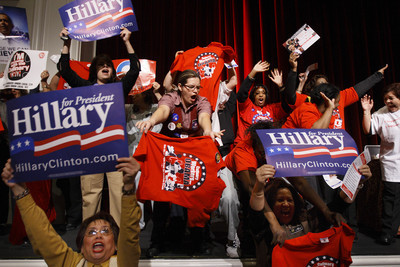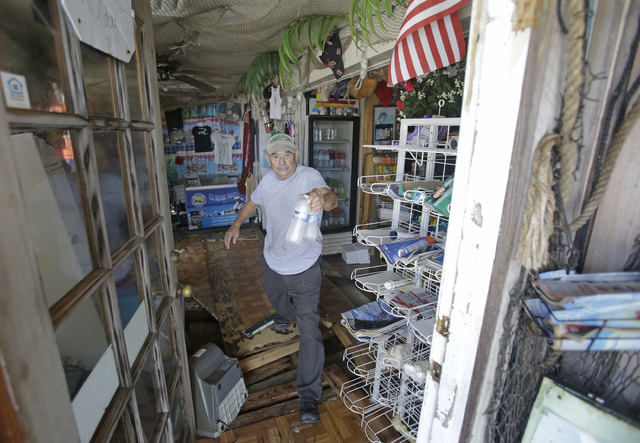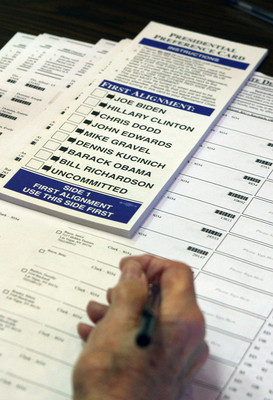Democrats looking at caucus complaints
It took a while, but the Nevada Democratic Party has undertaken a formal review of the many complaints about the Jan. 19 caucuses. The Republicans, however, have no such plans.
"We haven't done a full-scale review like the Democrats, but we have definitely compiled a list," Nevada Republican Party Executive Director Zac Moyle said.
"We had a hot line people could call on Election Day. But we haven't formed any kind of committee."
The Democrats' caucuses were more high-profile and attracted nearly three times as many people as the Republicans', but the GOP also experienced more participation than expected.
The high turnout and voters' unfamiliarity or dissatisfaction with the caucus process produced complaints on both sides.
The Democrats originally intended to conduct an internal, informal assessment of how the caucuses went. But the complaints became a political as well as procedural issue as the campaigns of both Barack Obama and Hillary Clinton charged that their supporters were intimidated or disenfranchised.
Obama's campaign wrote a letter of complaint to the party, while not disputing the results of the caucus, in which Clinton won the majority of the precinct delegates.
Facing the perception that the party was not dealing openly and comprehensively with the caucus issues, Democrats created a committee to review and analyze the hundreds of complaints, then make recommendations for improving the process.
Moyle said Republicans are just as committed to examining such issues, but would do so through normal party procedures, such as putting the topic up for discussion on the agenda of the party's next state central committee meeting.
He said such discussion was best kept within the party.
"One of the things we really wanted to do is bat it around with our leaders and the grass roots, as opposed to the entire community," Moyle said. "We've also gone around to talk to the communities that felt disenfranchised, such as the Jewish community, seniors and so on, to find out how we can go forward and not be excluding them."
Asked whether Republicans are committed to a better caucus next time around, Moyle said yes, "but hopefully that won't be for another 16 years" -- that is, assuming a Republican is elected, serves two terms and is succeeded by his vice president.
VOTING ON CHOOSING
A shadowy group of right-wingers, led, naturally, by Carson City activist Chuck Muth, has taken the first step toward putting school vouchers on the November ballot.
Muth last week filed paperwork with the secretary of state's office for a Ballot Advocacy Group. Called Parents for Better Education, its stated purpose is "to allow children access to better education."
It's not a sure thing. Muth and "some advisers," whom he would not name, are batting possible initiative language around. There are funding sources interested in backing the idea, he said, but "some people are worried that if it's not a success it would set the school choice movement back nationally."
Muth expects the group to reach a decision this week about whether to move forward. Muth said he believed a ballot measure was necessary because the Legislature, particularly the Democrat-controlled Assembly, would never approve such a proposal, no matter how much public support it enjoyed.
In November, a Utah referendum on vouchers was defeated at the polls. Muth said that was because "the teachers union came in and spent oodles of money and misrepresented what it would do, and they (the backers) didn't have the resources to compete."
A survey commissioned by the conservative Nevada Policy Research Institute, which is not involved in the potential ballot initiative, found recently that given a menu of options including home schooling, charter schools and private schools, just 11 percent of Nevadans would send their children to "regular public schools."
Muth, who home schools his young children, said he thinks parents are fed up with public schools' many problems, which he said include an agenda to indoctrinate students with a particular belief system.
"But this is not about the public schools," he said. "It's about trusting parents to make the decision about where they want their kids educated. I believe it's the right thing to do to let parents choose."
The Nevada State Education Association couldn't be reached for comment Friday.
State Senate Minority Leader Dina Titus, D-Las Vegas, an educator herself and a longtime ally of the teachers, said she'd need to see what the initiative said to judge it, but as a principle, she opposes vouchers.
"The notion of taking public dollars to pay for private school to me is just negating our societal responsibility to promote public education from which everybody benefits," she said.
BIRD? PLANE? DEMOCRAT!
Speaking of Titus, she is a member of an elite group that lately has been spotlighted by the bizarre nature of the Democratic presidential contest: The Superdelegates.
Superdelegates don't have the ability to fly or shoot spider webs from their wrists; they're members of the party establishment who are automatic unpledged delegates to the Democratic National Convention, including members of the Democratic National Committee and state and federal elected Democratic officials.
Nevada's superdelegates are our Democratic members of Congress, Harry Reid and Shelley Berkley; Nevada Democratic Chairwoman Jill Derby and First Vice Chairman Sam Lieberman; DNC members Titus and state Sen. Steven Horsford, D-Las Vegas; and Attorney General Catherine Cortez Masto, a co-chairwoman of the national Democratic Attorneys General Association.
Embattled former County Commissioner Yvonne Atkinson Gates also is a superdelegate, but it's not clear if she'll be counted as a member of the Nevada delegation. In 2004, she was a national at-large delegate by virtue of her position in the DNC's Black Caucus.
Reid, Derby, Lieberman and Masto are staying neutral, hoping a nominee can be crowned without them. Titus and Berkley support Clinton, while Horsford is for Obama.
Nationally, Clinton has a substantial lead among superdelegates.
Republicans also have automatic convention delegates, but they include only Republican National Committee members and state party chairs.
Obama's campaign has argued against superdelegates, saying their influence is undemocratic. Horsford voiced that view Friday, saying, "I shouldn't have any more say in helping select the Democratic nominee than the people who showed up at those caucus precincts."
Titus countered that the superdelegates have been in place for more than two decades and haven't been an issue until now.
She also pointed out that she is "not one of these mysterious people appointed by the DNC. I don't think that's been made clear. I was elected by party members at the state convention, and that was reaffirmed at the (Feb. 9 central committee) meeting in Pahrump, and Steven Horsford is the same way."
Horsford and Titus differ on another technical issue that could give Clinton, currently behind in the delegate count, an edge: whether to give back delegates that were stripped from Florida and Michigan for moving their primaries earlier than the DNC wanted.
The candidates all signed a pledge to the four approved early states, Iowa, New Hampshire, Nevada and South Carolina, that they would not legitimize those contests by campaigning in those states. Obama and others, but not Clinton, took their names off the ballot in Michigan.
Clinton won both states by a large margin and now is advocating for their delegates to be restored. Horsford accused her of trying to "change the rules in the middle of the game" and said the move was a betrayal of Nevada.
Titus responded, "That's a response you have if things aren't going your way. The whole question has to be worked out by the party, but I'm confident they're going to seat those delegations. I don't know how or how much, but you cannot ignore two big states like Florida and Michigan at the Democratic convention."
Contact reporter Molly Ball at mball @reviewjournal.com or (702) 387-2919.



















